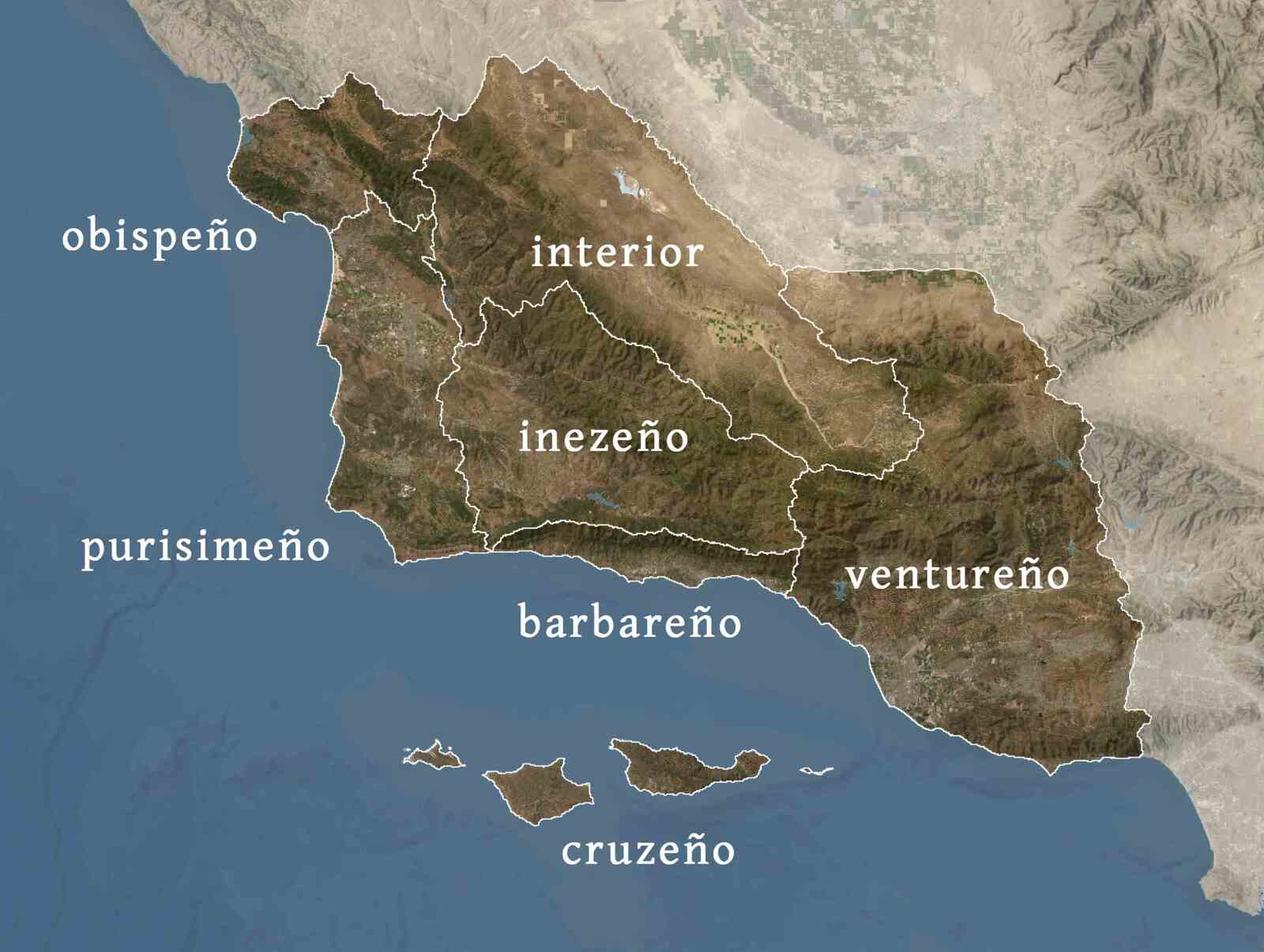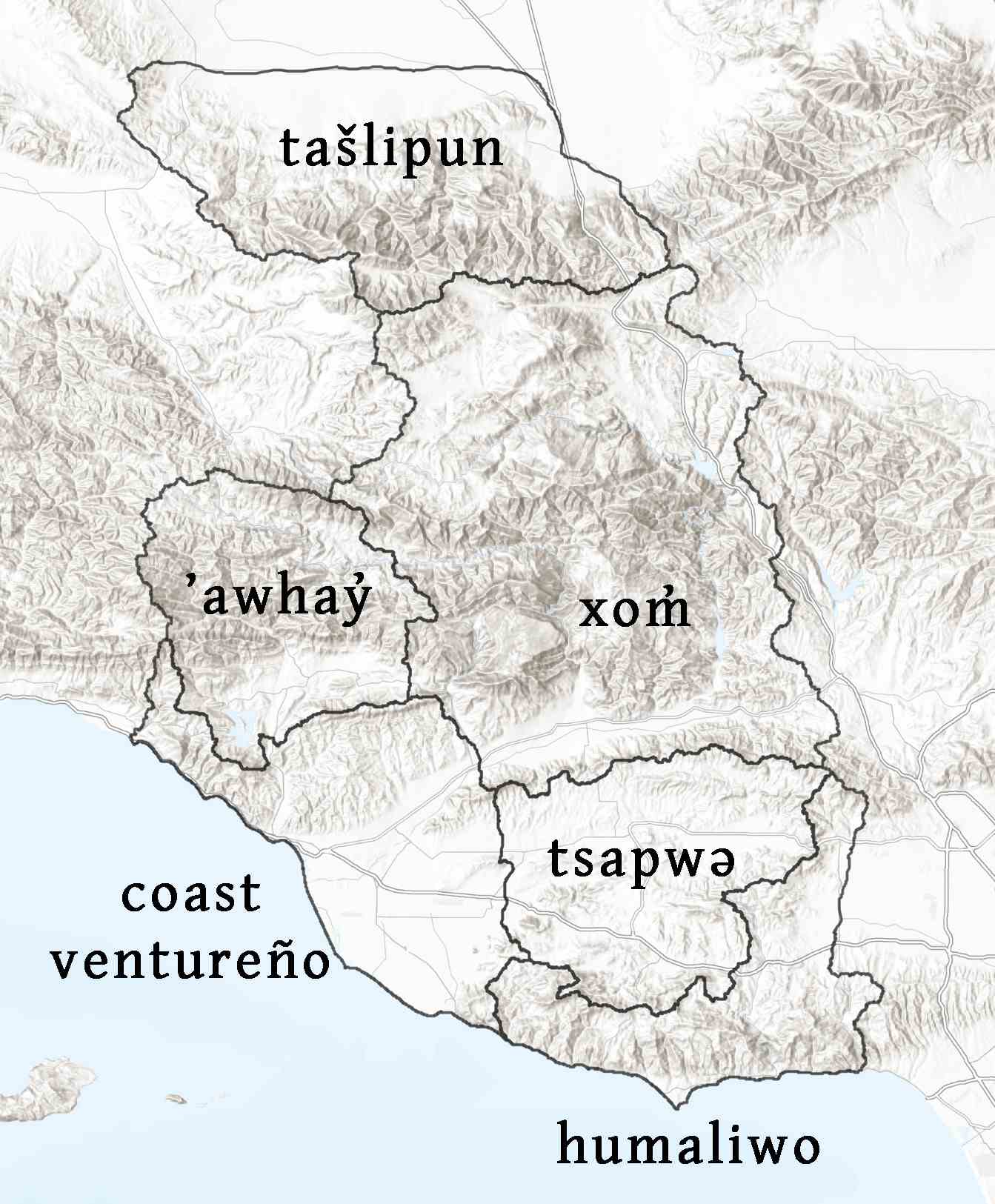Language Family
"Previous to Spanish and American arrivals, there was no overarching term for the family of languages today termed, "Chumashan." Once considered part of the Hokan language family, Chumashan is now understood to be one of 30+/- linguistic isolates in North America, unrelated to any other language families. Anthropologists consider isolates to be a sign of a very old culture. Indeed, some of the oldest signs of human existence have been found here in our homelands, on wima (Santa Rosa Island.)"

Languages within the Chumashan language family.
"With the exception of Cruzeño (also called Ysleño), the six languages of the "Chumashan" family have been referred to by the Missions built where the languages were spoken (Barbareño, Inezeño, etc.) Cuyama was once thought to be a 7th Chumashan language, but now these "Interior" languages are considered to have been dialectical variants of the central Chumashan languages."

Dialects of the Ventureño Chumash language.
Reclaiming terms
"When people were centralized at the missions, the rich dialectical variants died out and the dialect spoken near the mission prevailed. In revitalizing our languages, Chumash community members seek to step away from Mission references and refer to their language IN their own language. Here, we revitalize the "Coast Ventureño" dialect of the "Ventureño Chumash" language and we call it mitsqanaqan̓, the original place name where they built the San Buenaventura mission. At Santa Ynez, what was referred to as "Inezeño Chumash" is now called sʰamala, a term used by their ancestors."
Language Shift
"Successive conquests devastated our ancestral communities. People were forced to shift to Spanish, then English, languages. Despite these pressures, the mitsqanaqan̓ language survived an astonishing 200 years after initial contact, going to sleep in the early 1960’s. Today, a growing speech community has awakened the language and is dedicated to the revivance of mitsqanaqan̓ language and culture."
— All quotes excerpted from A brief history of our language
by Matthew Vestuto.
Illustrated maps copyright Devlin Gandy and Matthew Vestuto.
Our Work
One of the methods we work with is called "Reclaiming Domains in the Context of a Language Nest." We also engage in Conversation. A website with resources to facilitate language use is forthcoming and we will update this website with links in the future.
The online nature of this dictionary will allow us to add information from sources beyond the foundational Harrington slipfiles, such as the grammar of Juan Estevan Pico, mitsqanaqan̓ texts recorded by the Spanish along with vocabularies collected throughout the 19th century. This house (website) serves as a digital sanctuary to support and nurture the language and culture of the mitsqanaqan̓ language community. Any dictionary of a living language is always a work in progress. In the future, we will add neologisms (new words,) and audio recordings to increase the amount of accessible spoken language for the future generations.
kisunapay (We Honor)
First and foremost, we want to honor: Maria Antonio Tumamait-Leyva, Fernando Librado, José Juan Olivas, Juan Estevan Pico, Simplicio Pico, Pelegrino Romero, Cecilio Tumamait & Candelaria Valenzuela, for their work with John Harrington and others. Their work assures that our language and culture will survive. They have nurtured us, the modern ones, and we will follow in their spirit.
kikǝ ’an kiyalaqkumi’ił (We Are Grateful)
Lastly, representatives of the mitsqanaqan̓ speaking community, Salvador Ambriz, Raudel Banuelos, Eleanor Fishburn, Dr. Timothy Henry-Rodriguez, and Matthew Vestuto, are grateful to our friends at California State University Channel Islands including the members of the House of Language committee - a collaboration between staff in the Broome Library, Information Technology Services, and the Office of the President - for the creation of this website: Jim August, Asha Ramachandra, Brian Manson, Daniel Martinez, Ryan Garcia, Catherine Paolillo, and Kaia Tollefson; as well as President Richard Yao and the members of the President’s Chumash Advisory Council for their support. And special thanks to linguists, Andrew Garrett and Kenneth Whistler for their invaluable contributions to our project.
